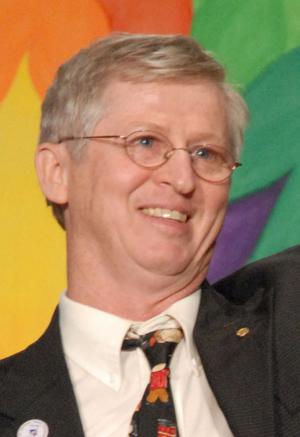
By Barb Arland-Fye
DAVENPORT — Parishes have grown accustomed to the role of service provider to their parishioners, or “consumers,” in the parlance of our consumer-provider oriented society.
Providing services is important. But for those engaged in youth ministry and religious education, fostering relationships is essential to partnering with parents in forming their children’s faith.
That was an insight participants picked up during the “Raising Expectations” presentation which Greg “Dobie” Moser gave last month at diocesan headquarters in Davenport. Moser is executive director of Youth and Young Adult Ministry and CYO at Cleveland Catholic Charities in the Diocese of Cleveland, Ohio. He spoke last fall in Solon on the “Strong Catholic Families/Strong Catholic Youth” initiative and expanded on the conversation in his April 11 presentation.
While Moser’s presentation focused on partnering with parents to assist them in the faith formation of their children and young adults, he also spoke to “the need for parish leadership to partner with others in the parish,” said IlaMae Hanisch. She is the Davenport Diocese’s coordinator of Ministry Formation and Adult/Family Formation.
“He provided insight into the consumer-provider mode of operation in our culture and how it has dramatically altered our mode of operation in our faith communities, in our parishes,” she said. “People come to the parish wanting to ‘get the sacraments,’ or have some other need and we respond as the provider. What is missing is the faith connection that calls all in parish leadership to develop relationships so people feel connected to the Church. When we become a ‘provider of services’ we limit everyone’s involvement in the faith community. We don’t fully become the faith community that Christ calls us to become,” Hanisch said.
“The one message I took away and want to practice more is building relationships with the people and children to whom I minister,” said Sister Roberta Brich, CHM, director of religious education for St. Anthony Parish in Davenport. “Coming from an educational background, I find I want to ‘teach’ and ‘fix’ the problem when, many times, what is needed is ‘listening’ — to understand what is going on with the person.”
She agreed with Moser’s observation that “we need to work harder at making our religious education programs more family oriented. We will be discussing at our catechist and parent meetings the needs of the families and how we can, together, meet these needs as we continue to build a family-oriented program. One example is to have a ‘family’ Mass rather than a ‘student’ Mass. We understand content is important, but we also understand the parent is the first teacher. We want to support this in any way we can,” Sr. Brich said.
Faith Formation Coordinator Crystal DeNeve of St. Mary Parish in Grinnell appreciated Moser’s down-to-earth and pastoral approach. “We need to be so much more pastoral to our families and to understand that they are coming from a lot of different experiences and we need to remember that they may be having a tough time,” she said. “We’re there to help them, not condemn them.”
DeNeve also took to heart Moser’s message about how things that happen to an individual as a child have profound, lasting effects. Being aware of, and sensitive to, that fact is important in building relationships. It’s also important to reach out to parents because that’s where children get their information about their Catholic faith, she said.
Pat Sheil, director of religious education/youth minster for St. Joseph Parish in DeWitt, said what she took away from Moser’s presentation “is that as a Church we need to prioritize our families and youth. The National Study of Youth and Religion makes it clear that children follow the example of their parents. We as Church need to reinforce ways families can become stronger in our faith. In the parish, ideally, we would have more parental involvement in religious education, more interaction with the school and religious education. A commitment to well-trained teachers, DREs, youth ministers and young adult ministers is vital to the life of our Church.”
During the presentation, Moser handed out a sample survey that could be used in parishes asking parents how the parish might better support and partner with them. The parish leadership, in turn, needs to respond in a very intentional and caring way.
Hanisch said she thought to herself, “How will parish leaders be able to respond to those who fill out the survey? It would be like the pressure Jesus must have felt when crowds started following him and their needs were identified. We need to do what Jesus did, train others to carry on that mission; we need to better utilize the gifts and charisms of people in the parish to reach out to those in need.”








